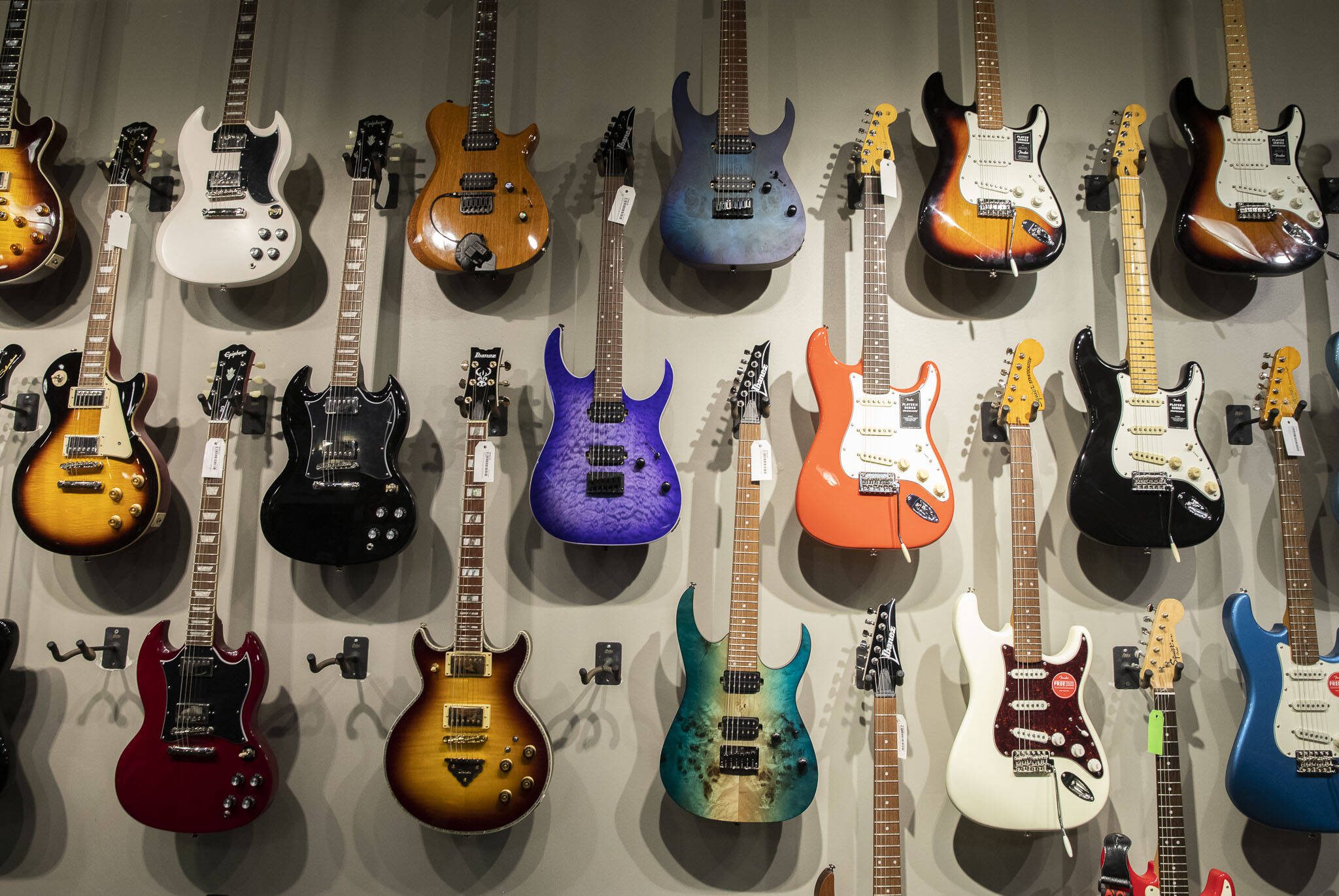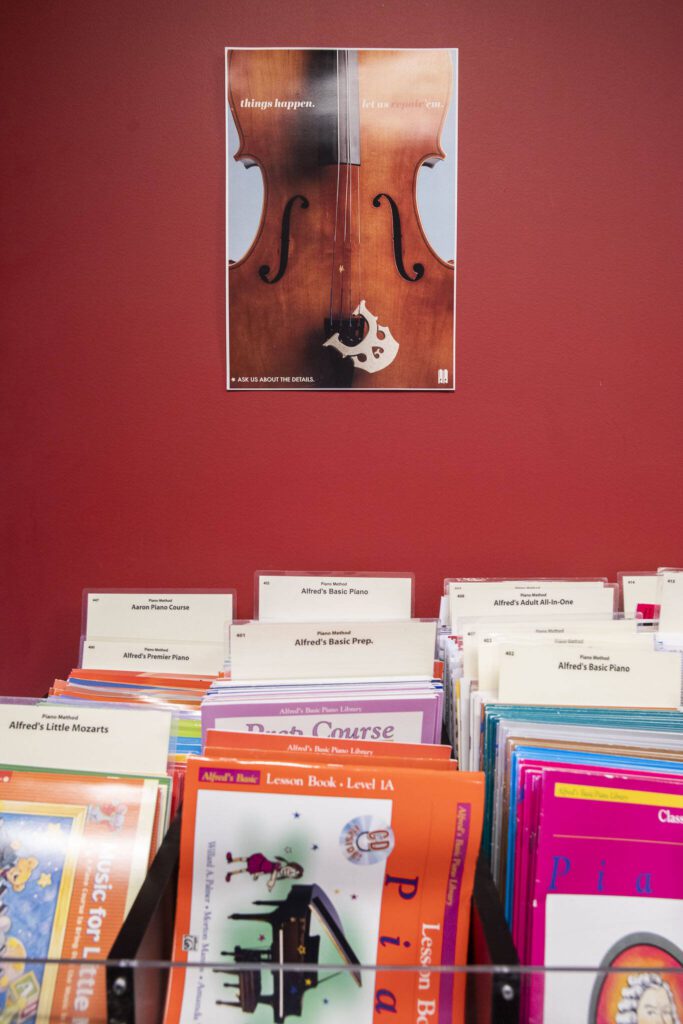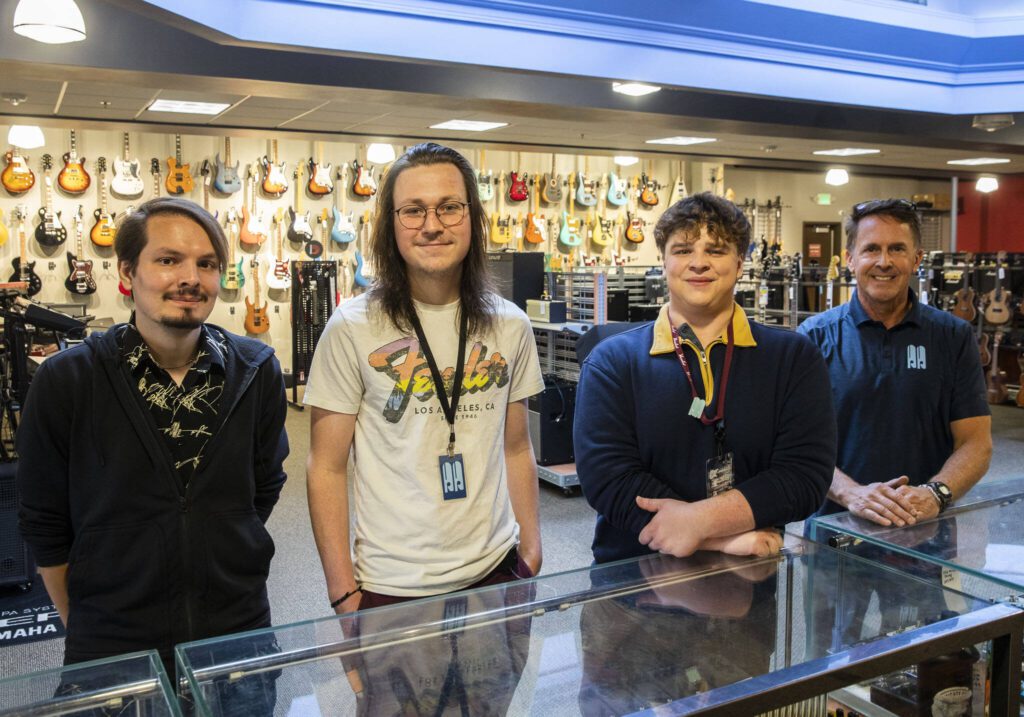EVERETT — Valerie Bennett recently treated herself to a new violin, nicer than the one she played 70 years ago in junior high.
There was just one problem — Bennett, 81, couldn’t remember how to play.
Then she found violin instructor Doug Spencer at Kennelly Keys Music in Everett.
Weekly lessons revived her skills, sparked joy and even soothed some savage beasts, Lucy and Chanell. Her two chihuahuas love to listen.
Neuroscientists agree: It’s never too late to learn to play a musical instrument. It can beef up your brain cells and might even turn you into the life of the party.
“I’ve had students as old as 90,” said Spencer, who’s taught music for 60 years. “Age is nothing. I have a lady in her 80s who takes saxophone.” He charges $37 for a 30-minute lesson.
Instead of fiddling with your phone, you could be learning to play guitar, piano, cello, trombone or clarinet. (Spencer teaches them all!)
Turning 65
Not sure if you’re a strummer or a drummer?
“Treat this like a petting zoo and try them all,” said Neil Northrop, who manages the Kennelly Keys store in Everett at 7903 Evergreen Way.
When it comes to choosing an instrument, Northrup can help you hit the right note.
He plays guitar, piano and drums and takes voice lessons at the retailer’s flagship store in Lynnwood. Or tap staffer Aidan Gray, who plays saxophone, clarinet and “all the band instruments.”
The Lynnwood-based retail chain sells new and used musical instruments, accessories and sheet music at its stores in Everett, Lynnwood, Bellevue and Seattle.
Each offers plenty of studio space for equipment try-outs and lessons.
“Instructors like Spencer are integral to our business,” said Billy Kennelly, owner of Kennelly Keys. “Their willingness to share their craft helps us stay healthy and compete with online retailers.”
The music chain turns 65 in 2025 — with no plans to retire, Kennelly said. His parents met at an Arthur Murray dance studio and launched the business in 1960.
The three Kennelly-branded stores carry guitars and keyboards, plus a full line of band and orchestra instruments. American Music, in Seattle’s Fremont neighborhood, caters to the “working rock n’ roll musician,” Kennelly said.
New acoustic and electric guitars range in price from $200 to thousands of dollars. Or snag a ukulele for $59.
These days guitars and electric pianos can be plugged into recording devices that let you mix and lay down multiple tracks. Add a pair of headphones and there’s no need to fret about the neighbors when you pump up the volume.
Break a string?
Kennelly Keys offers home delivery, plus help with set-ups.
Violins, guitars, clarinets and other instruments rent for $20 to $40 a month with no strings attached, Kennelly said.
“You can rent for as little as one month,” he said.
If a tuba isn’t your cup of tea, test drive a trombone for 30 days.
“We try to keep rental prices low for the kids,” he said. “So they can become the next John Mayer or Taylor Swift.”
However long it takes
While your parents may have cracked the whip and demanded hour-long practice sessions under the “I paid good money for these lessons,” decree, adult students set their own tempo.
How often you practice is up to you, Spencer said.
Spencer encourages 20 or 30 minutes a day. At that rate in three month’s time, most students will have a solid playlist, he said.
But no worries if the boss, in-laws or kids cut into your time.
“I don’t question my adult students whether they’ve practiced or not. Every student learns differently and at a different rate,” Spencer said.
Shan Candelario, who teaches guitar, bass guitar and ukulele, has been teaching at Kennelly outlets for 27 years; Spencer for 35 years.
Both say they’ve taught hundreds of students over 60.
Older students sometimes worry their bodies won’t measure up.
One of Spencer’s students has trigger fingers, which can cause joints to stiffen and lock. She still manages to play a mean flute and recorder, he said.
Dexterity and flexibility can wane with age, but there are ways around it, Candelario said.
Metal guitar strings can be replaced with more forgiving nylon strings.
Instead of using five finger chords you can make three finger or two finger chords — even one-finger chords, Candelario said.
“We work at the student’s pace, there’s no timeline, no pace,” Candelario said. “However long it takes, it takes.”
Paid in joy
Like Bennett, Brenda Mann Harrison also took a lengthy musical break.
The last time she touched the ivories was in middle school.
In the interim, “life got busy,” she said.
One of the first things Mann Harrison did before retiring this year was to find a piano teacher.
“It was my goal — relearn the piano,” she said.
She started from scratch.
“I had to relearn everything,” said the Snohomish resident and former journalism development director for The Daily Herald.
“The mental challenge and life lesson is that nothing comes easy, you have to work at it.”
The effort has paid off.
“Once you get it down you can be expressive and make the music say what you want it to say,” Mann Harrison said.
She continued: “Music brings me joy. I think it should be part of everyone’s life.”
Janice Podsada is a freelance writer and former employee of The Daily Herald.
Talk to us
> Give us your news tips.
> Send us a letter to the editor.
> More Herald contact information.





























